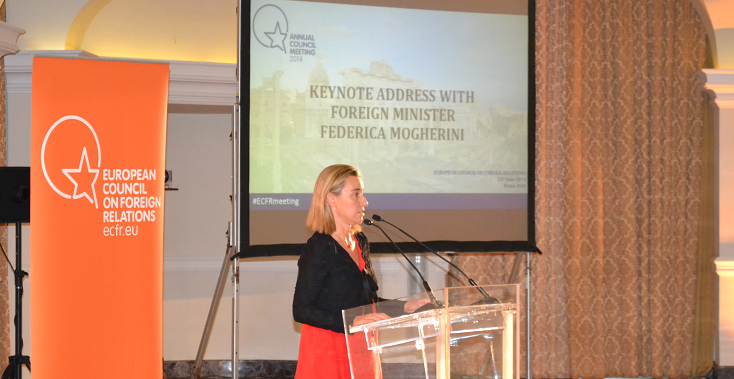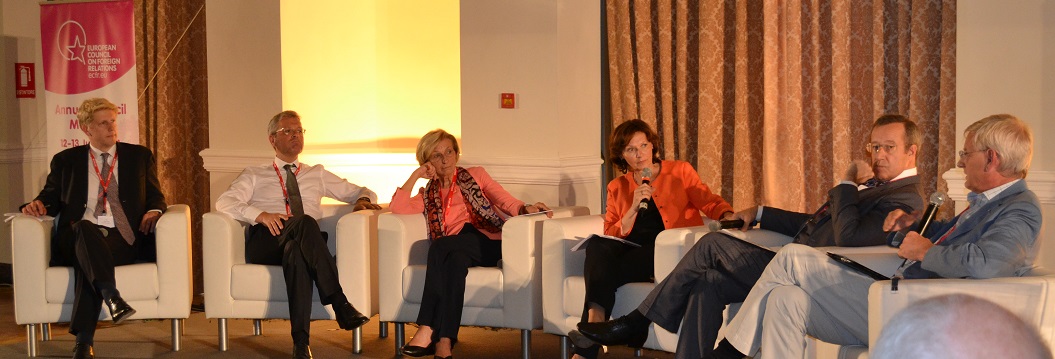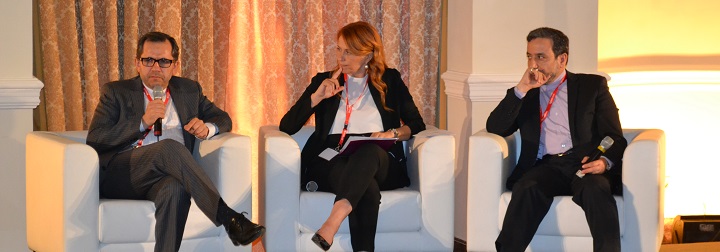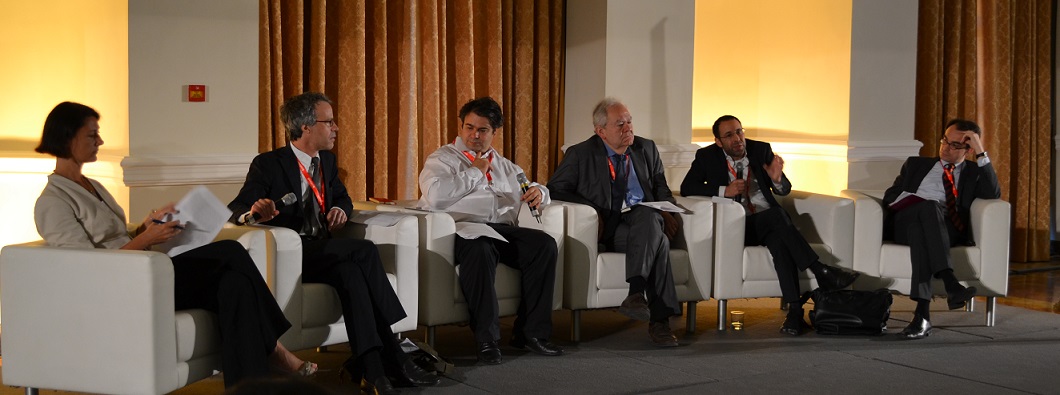Every year, the ECFR Council – an unrivalled European strategic community of over 200 members – meets as a full body in a key European capital at the ECFR Annual Council Meeting. The meeting is an excellent opportunity for ECFR Council Members alongside external high-level speakers to discuss the most pressing foreign policy challenges of the day and look creatively at Europe’s long-term prospects.
This year’s meeting looked at the results of the European Parliamentary elections and what they mean for Europe; what lies ahead for the EU-Russia relationship after the events in Ukraine; the possibility of a war in Asia; and the Iran / Saudi fault line. The meeting has taken place on 12-13 June 2014.
ON-RECORD SESSIONS:
Keynote address by Italian Foreign Minister Federica Mogherini Europe's Crises Special Session on Iran 10 consequences of Ukraine Prince Turki Al-Faisal Debate: Spitzenkandidat now or never? Syria after the elections. Assad victorious? European Parliamentary elections: Post-mortem The EU after the elections: what you see is what you get?
12-13/06/2014
WELCOME SPEECH
Martti Ahtisaari, co-chair of the Board, ECFR
Mark Leonard, Director, ECFR
Dick Oosting, CEO, ECFR
Federica Mogherini, Foreign Minister of Italy

The current events in Iraq remind us how important it is to focus on what comes after the military intervention. The problems aren’t gone when the troops leave. We need to think about this with Afghanistan.
A crucial question for the EU now is how to envisage EU-Russian and EU-NATO-Russian relations in the future […] We need to reshape and rethink our strategy and not to return to Cold War rhetoric. […] Despite the urgency of the situation, which I fully appreciate, we must not rush to hasty conclusions.
The EU is dealing with three simultaneous major crises: a geopolitical crisis in its neighbourhood (eastern and southern); an economic crisis in the eurozone; and a political crisis following the European elections. These crises are also leading to divisions between member states - between East and West, North and South, eurozone and euro-outs as well as between mainstream political parties and the new forces that have risen to cope with them. What are the implications of these crises for the European project? Is there a new vision of Europe that would appeal across the major divisions and restore confidence in the EU as a project?
Carl Bildt, Foreign Minister of Sweden
Emma Bonino, Former Foreign Minister of Italy
President Toomas Ilves, President of Estonia
Jo Johnson, Head of Policy Unit, Office of the Prime Minister of the UK
Norbert Röttgen, Chair, Foreign Affairs Committee, Bundestag
Moderator: Sylvie Kauffmann, Editorial Director, Le Monde

The truth is that, both before Vilnius and now, the EU has offered the Ukrainians less than they want (…) We need to discuss our regional responsibilities. Let’s not call it enlargement since some countries would go ballistic. Call it something else – but we need to have the debate.
Carl Bildt
The refugee crisis must be addressed. 40,000 people have come to Italy in this year so far – as many as in all of 2013. It is simply ridiculous to think that Italy and Malta can solve this alone.
Emma Bonino
The EU cannot talk about a strategic partnership with Russia anymore. Every agreement made with them since the Second World War, from article 2 of the UN Charter to the Helsinki Accords and the Paris Charter, has been violated.
Toomas Ilves
Europe cannot afford to ignore Eurosceptic parties. The message is that Europe is not working.
Jo Johnson
On the European debt crisis – we have managed to stabilise and restore trust in the financial markets – but we have not resolved the underlying problems.
Norbert Röttgen
Abbas Aragchi, Deputy Foreign Minister of Iran
Majid Takht Ravandachi, Deputy Foreign Minister of Iran

If cannot come to a nuclear deal now, we will go back to enrichment and no inspectors. This is not a threat, it is a statement of fact. If a deal is reached, a new relationship with Europe will start.
Abbas Aragchi
Iran is prepared to go the extra mile for relations with our neighbours, we will do whatever is necessary for more co-operation and understanding.
Majid Takht Ravanchi
SYRIA AFTER THE ELECTIONS: ASSAD VICTORIOUS?
Having consolidated his hold over central Syria, and with factionalism and extremism continuing to blight the opposition, is Assad now on the path to victory or will the absence of legitimacy and his campaign of domestic repression eventually catch up with him? And in this context is there any room for international actors to stem the fighting and respond to the urgent humanitarian crisis engulfing the country?
Malik Al-Abdeh, Journalist
Julien Barnes-Dacey, Senior Policy Fellow, ECFR
Kristalina Georgieva, European Commissioner for International Cooperation, Humanitarian Aid and Crisis Response
Jean-Marie Guéhenno, Former Deputy Joint Envoy of the UN and Arab States on Syria
Ana Palacio, Member of the Council of State; former Foreign Minister of Spain
Moderator: Andrew Puddephatt, Director, Global Partners & Associated Ltd
The Syrian presidential election held in early June, and called a farce by the opposition and its Western allies, is a reminder that the Damascus regime is not close to relinquishing power. Quite the opposite, Assad's electoral success with 88.7% of the votes and his new seven-year term underscore his unyielding hold on power, more than three years after the start of the Syrian uprising that has turned into a bloody civil war. Yet can one really speak of a "victory"? The Allawite leader's win was largely a foregone conclusion, with other candidates Hassan Nouri and Maher Hajjar part of the co-opted opposition, voting organised in government-controlled areas, and continued military attacks across the country. More importantly, Assad's so-called victory will not end the conflict that is still raging or allow for a viable transition. Instead, it will likely exacerbate violence on the ground and the regional confrontation around Syria.
In fact, Assad continues to enjoy the support of both Iran (and its Shia allies, including Hezbollah) and Russia, while the United States and the West still back the moderate segment of the rebellion – as opposed to Gulf monarchies closer to its radical elements. The EU joined Washington in condemning the 3 June vote and the regime's unremitting killing. At the same time, Western policies have so far failed to defeat Assad and therefore impose to rethink the contours of what a Syrian transition could look like, if one remains envisageable. Indeed, not only has Assad clung to power, but Syria is plunged into a full-fledged civil war that blurs many of the dynamics on the ground, while serving Damascus' objective to ensure its survival at any cost. Through elections and not a referendum like in the past, Assad looked for legitimacy – certainly not democratic, but one of pure domination.
In this respect, it is to be feared that the very recent takeover of the Islamic State of Iraq and the Levant in Mosul and other Iraqi cities will only further reinforce Assad's anti-terrorist narrative and his portrayal of the larger Syrian opposition as a crowd of terrorists threatening civilians and unable to govern. Concerns that the jihadists might impose themselves in Syria could as well increase domestic support for the regime, now seen by some as the lesser evil. This, of course, will not solve the Syrian quagmire.
THE EU AFTER THE ELECTIONS: WHAT YOU SEE IS WHAT YOU GET?
The financial crisis has created a fragmented, unequal and less popular Europe, and as shown by the last elections, a significant number of people have turned their back on the EU. However, with a rise in eurosceptic populism and the lack of growth and jobs, the EU requires active engagement more than ever from its citizens, and political will and courage from its policymakers. The question now is not whether Europe should move ahead, but how.
Han ten Broeke, Member of the Dutch House of Representatives
Bernard Kouchner, Former Minister of Foreign Affairs of France
Alexander Graf Lambsdorff, Member of the European Parliament
George Papandreou, Former Prime Minister of Greece
José-Ignacio Torreblanca, Head of Reinvention programme, ECFR
Moderator: Wolfgang Münchau, President, Eurointelligence LTD
The financial crisis resulted in a fragmented, unequal and unpopular Europe, and - as demonstrated by the recent European elections - a significant number of people have turned their back on the EU. However, with the rise in eurosceptic populism and the lack of growth and jobs, the EU now more than ever requires active engagement from its citizens and political courage from its policymakers. The question now is not whether Europe should move ahead, but how.
In the interest of avoiding frantic activism, the participants of this panel agreed that a substantive analysis of the reasons for the mixed results is needed. They identified three major clusters:
1) Turnout: The overall turnout of 43.1 percent was a source of relief across party lines, as it shows that the downward trend of previous European elections could be stopped. However, some MEPs in the room admitted to feeling depressed by the low turnout in eastern parts of the EU. In fact, the six lowest turnouts were from Central and Eastern European member states including Poland (22.7 percent) where the general support for the EU remains remarkably high (72 percent according to a 2014 PewCenter survey. “Eurosclerosis” is no longer just a Western European Western phenomenon!
2) The North/South divide: It is usual for European election campaigns to differ from country to country. In this election, however, the campaigns seemed to split on geographical lines, specifically the North/South divide. For example, the Social Democrats in Spain campaigned on issues of European democracy and social justice while the German parties focused more on the ongoing need for structural reforms and budget consolidation.
3) How to deal with the rise of Eurosceptic parties: Most speakers pointed out that the Eurosceptic insurgency is not only a European but a national challenge. In many cases, the success of Anti-European forces was rooted in the failure of national governments to deliver, and the results in France were the most prominent example of this. Many European citizens were attracted by the way the Eurosceptic camp addressed their concerns, regardless of whether their policies would actually address their problems. The ‘More Europe’-camp missed the opportunity to set an agenda for Europe, but the aftermath of the European elections might be a make-or-break moment to make the case for Europe. The role of Europe on the international stage will be important in in this debate, as Europe needs an active role on the global stage or it risks becoming a victim of globalization. Or as one speaker put it: We need a “European Deal"!
THE UKRAINE CRISIS AND EUROPE’S ENERGY SECURITY
Erik Berglöf, Chief Economist and Special Advisor to the President, EBRD
Chi Kong Chyong, Visiting Fellow, ECFR
Lykke Friis, Former Danish Minister for Climate and Energy
Anita Orbán, Ambassador-at-Large for Energy Security, Ministry of Foreign Affairs of Hungary
Moderator: Marco Margheri, Senior Vice President, Public and EU Affairs, Edison
EUROPEAN PARLIAMENTARY ELECTIONS: POST-MORTEM
Two issues have dominated the European elections: low turnout and the rise of populism. Neither are new phenomena but have been revitalised by the crisis. This session will analyse the results of the recent European parliamentary elections and try to understand how people voted and what this means for the new Parliament.
Peter Kellner, President, YouGov
Laurence Parisot, Vice President, IFOP
Moderator: Mabel van Oranje, Co-Chair of the Board, ECFR
ECFR Annual Council Meeting: European Parliamentary Elections: Post-Mortem by Ecfr on Mixcloud
10 CONSEQUENCES OF UKRAINE

Piotr Buras, Head of ECFR Warsaw Office
Anthony Dworkin, Senior Policy Fellow, ECFR
François Godement, Head of ECFR Asia & China Programme
Mark Leonard, ECFR Director
Daniel Levy, Head of the Middle East & North Africa Programme
Kadri Liik, Head of ECFR Wider Europe Programme
Russian actions – and Western responses to them – will not lead to the unwinding of the current international order, but they could accelerate the process. For the last few decades, Western powers have benefited from an international architecture they designed and policed. Although rising powers such as Brazil, China, and India have not overturned these post–war institutions, they are uncomfortable with the way the West has used global institutions to pursue its own interests and are increasingly “routing around” global institutions by creating bilateral arrangements while caucusing within them to hollow out the liberal bias of their rules and regulations. If the West now tries to use these institutions to act not just against Iran and North Korea but against Russia – a permanent member of the United Nations Security Council – it may find that it encourages revisionism rather than deterring it.
“The world will never be the same again”, said European Council President Herman van Rompuy after Crimea, conjuring up a geopolitical awakening at the heart of the EU. So far the crisis has been contained to Ukraine rather than spilling over across the post-Soviet space or bringing the global economy to its knees. What will the longer-term global consequences of the Ukraine crisis be? That is the question that we have tried to answer by drawing on the expertise of all ECFR’s programmes, compiling here 10 of the striking effects.
Our findings are framed by a bigger story about global order that predates the crisis in Ukraine. Since the end of the Cold War, the world has benefited from two orders: an American-led security order that ensured a balance of power in every region, and a European-led legal order that sought to write rules for our interdependent world – in everything from free trade and climate emissions to financial transactions and genocide. The backdrop to the Ukraine crisis is the fraying of the American-led security order as non-Western powers rise and the US recalibrates its foreign policy after a decade of war. Increasingly, the West seems to be trying to compensate for its lack of willingness to use military power by “weaponising” the international legal order – that is, using financial sanctions, asset freezes, and international law to shape the choices of revisionist powers.
Wider Europe
1 Raising the stakes in Russia. In the future, the annexation of Crimea may look like a watershed moment for Russia itself. It has dramatically intensified the internal political and economic strains that Putin’s authoritarian regime was already facing and thus created a domestic pressure cooker, which may relatively quickly spawn either fully-fledged authoritarianism or the collapse of the regime – the exact contours of the outcome remain anyone's guess for now.
2 An open challenge to the European Order. By annexing Crimea and intervening in Ukraine, Russia has raised fundamental questions about the principles of the European order. Russia was always against the principle that countries are free to choose their alliances and has consistently, though often covertly, tried to derail NATO enlargement into its neighbourhood. But Putin is now challenging these principles explicitly. Russia wants to both restore and re-legitimise spheres of influence as an organising principle of European order. This is a direct challenge to Europe and the West as a whole: although some countries might be willing to accept implicitly Russia's view of European order, none can afford to do so explicitly. But it seems even less likely than before that Russia will accept the Western-led order.
International law
3 Contest for international norms. We face a contested international normative terrain. Russia's actions under Putin represent a two-pronged attack on Western ideas of international order. First, Putin challenges the principled basis of Western policy, asserting that the US and Europe only pretend to respect international law but in fact are happy to act outside it when their interests are at stake. He cites Kosovo, Iraq, and Libya as evidence. Secondly, he presents an essentially illiberal vision of world order that he claims to be more realistic, based on spheres of influence, opposition to popular empowerment and favouring one's own national or linguistic group – in each respect a direct opposite of Western ideas of liberal order.
4 The West loses the Rest.Despite the fact that Russia’s use of force to annex territory set a precedent that threatens widespread disorder, the world has not taken the West's side. The large number of abstentions in the UN General Assembly vote shows that many countries see this as a struggle between power blocs rather than as a fundamental question of international order and do not accept the West's self-identification as the guardian of liberal order. The “Rest” – that is, non-Western countries – have found some of the actions cited by Putin troubling and do not separate their views of Western-backed liberal order from their conviction that the West enjoys an unjustified position of privilege in the international system. We should reject any equivalence between controversial Western actions and Russian action in Ukraine, but we also need to revisit and strengthen the international foundations of the liberal vision.
Middle East & North Africa
5 The beginning of the end of sanctions. The West's Middle East adversaries have been at the sharpest end of the impact of punitive US-led economic sanctions – from Libya and Iraq and more recently Iran, which continue to this day. The Ukraine crisis could mark the beginning of the denouement of economic sanctions as the preferred instrument of contemporary US coercive power. Going after Russia, the world's 9th largest economy, may represent the kind of overreach in economic coercion that the Iraq war demonstrated in the military arena. Expect some acceleration of efforts by an "alliance of the threatened" to develop circumvention options (bank and payment systems, reserve currencies) to insulate themselves from the US Treasury’s Office of Foreign Assets Control. This will have implications for the Middle East and far beyond. And Europe too might want to question the desirability of being so exposed to the predilections of the US treasury – as the current predicament of BNP Paribas indicates.
6 Looking to MENA for energy.Any European strategy to reduce energy dependence on Russia will inevitably turn its attention to the Middle East. Alongside existing sources in Algeria and the states of the Gulf Cooperation Council, the Ukraine crisis could make the sanctioned Iranian energy market look ever more attractive – encouraging Russia-Iranian competition as opposed to cooperation. Or Europe might refocus attention on Libya and to bringing its potential 1.6 million barrels per day back online, or see new opportunities in the Kurdish or other regions of Iraq especially given new pipeline options via Turkey. The prospects for a serious Middle East energy pivot may prove as elusive as they are tantalising, but they should be on Europe’s radar.
Asia & China
7 Asian countries are competing to woo Putin. As tensions increase in Asia, many countries in the region are trying to strengthen their strategic relationships with external powers – and despite its actions in Ukraine, even Western allies in Asia have continued to woo Putin’s Russia. For example, Japanese Prime Minister Shinzo Abe has opened up to Russia because he is seeking a territorial settlement over the four islands that both Tokyo and Beijing claim, and wants to keep Russia from joining China’s side. Similarly, South Korea is engaging to get Moscow’s cooperation with North Korea. By comparison, Europeans do not have in Asia the leverage that would allow them to enlist Asian countries’ full cooperation on issues such as Crimea and Ukraine.
8 Asia hates western intervention even more than self-determination.Given that many Asian countries worry about their own secessionist regions, you would think that they would oppose Russia’s annexation of Crimea. But the Ukraine crisis illustrates how they worry even more about Western intervention. Given the choice between self-determination and holding sovereignty sacred, Asia mostly chooses the latter. Even India, which should worry about any referendum on secession because of the Kashmir issue, and especially China, which sees a chance of enlisting Russia in its own territorial gambits.
European Union
9 European unity in escalation.In the past, relations with Russia were the most divisive issue in European foreign policy. But the EU has maintained cohesion in responding to Putin’s aggression with limited sanctions, political and economic support for the new Ukrainian leadership, and the maintenance of diplomatic channels with Russia. Poland and the Baltic states wanted a bolder response but compromised in the name of European unity. The recent decision of the Bulgarian government to suspend the construction of South Stream shows that the European Commission’s pressure is working. And Europe still possesses its weapon of mass destruction which gives it a leverage on Russia: access to its financial sector. The EU has to work on how to fine tune this weapon and use it as a deterrence.
10 The risk of disunity with de-escalation.However, the crisis has also showed that this unity, as much as it is valuable, has been fragile and lacking leadership. Most notably, neither the Weimar Triangle, nor the Visegrad Group – two formats which could provide stronger impulses for both crisis management and long term strategy towards EaP countries and Russia – have been efficient. Sure, many countries previously most engaged in the EU Eastern policy (Poland, Germany, Slovakia, Czech republic, Hungary) have managed to agree on relatively low-common-denominator reactions to the ongoing developments in Ukraine. But they remain divided on the long term issues that will determine EU policy in the future: most notably a possible energy union and the lessons learned from the failure of the Vilnius summit. Competing readings of the mistakes made by the EU in its policy towards Eastern partners (“bad communication of this policy to Russia” versus “insufficient offer to Ukraine”) may make the current consensus difficult to sustain.
.
SPECIAL SESSION WITH HRH PRINCE TURKI AL-FAISAL

Prince Turki Al Faisal's written remarks:
"Ladies and Gentlemen, thank you for inviting me to speak to you, today.
The relationship between Saudi Arabia and Iran, and the tensions it draws through Middle Eastern culture and policy, is often described as a “fault line.” The term implies that the schism between the two countries is deep, volatile, and beyond repair. In reality, though, the “fault line” between Saudi Arabia and Iran is more like an estrangement. Although tensions exist between the two nations, they have a long shared history and their relationship has the potential to grow and change. Today, Europe is keeping a close eye on Iran’s nuclear activities and its increasingly aggressive interference in other countries. In order to address the threat of the Iranian leadership, Europe must first understand the complexities of the Saudi-Iranian relationship and learn to rely on Saudi Arabia’s leadership and expertise in dealing with the Iranian regime.
Since the time of the Islamic conquests, when conquerors from the Hijaz and Najd brought Islam to neighboring nations and empires, Persian and Arab cultures have intertwined in the flowering of Islamic arts, sciences, government, and networks of religious scholarship. In the 20th century, both Iran and Saudi Arabia found new roles as major oil producers and negotiated their status as regional leaders in the postcolonial Middle East. In many ways, Iran’s present role in the Middle East is best understood in light of its relationship with Saudi Arabia: Iran’s attempted rivalry with the Kingdom, and especially its claim to represent the international Shi’a community, is the engine driving much of its conflict with its neighbors." Read all (download)
CHINA’S RULE VERSUS THE POWER OF RULES
Until recently, territorial disputes and historical perceptions have not been seen as likely causes for war in Asia. This has now changed as territorial disputes are escalating, particularly between China and various Southeast Asian countries, including Vietnam, and Japan. Meanwhile, the US “rebalance” to the Asia-Pacific is in fact falling off balance. What is the likelihood of war in Asia?
Robert Cooper, Former Counsellor, EEAS
Teresa Patricio Gouveia, Trustee of the Board, Calouste Gulbenkian Foundation
Volker Stanzel, Former German Ambassador to China and Japan
Moderator: Lluís Bassets, Deputy Director, El País
The discussion focused mainly on the threat of violent conflict in Asia, and whether China could trigger a serious crisis. The consensus on the likelihood of war, putting the Asian order at stake, highlighted the dimension of the consequences for Europe, and the urgency for Europeans to deal with the present escalation of tensions. Europe’s interests in the stability of the region makes it imperative to improve relations with every Asian country – not just major trading partners such as China – and to try to defuse the situation.
Despite concerns over increasing volatility of China's disputes with Japan and South East Asian states (mainly Vietnam and the Philippines currently) over territorial questions, the panellists agreed that China does not want a war. It may, however, be ready to risk it. One problem is that the complexity of linkages between Chinese foreign and domestic policies leave the outside world uncertain over Beijing’s next steps. One of the participants compared China's behaviour to that of Japan in the 1930s, where economic policy objectives, ideology as well as nationalism played a similar role in causing an aggressive foreign policy. There is a clear leader (xi Jinping), and the elite is largely Western-educated, which influences China's perspective of the outside world. Xi Jinping has ended the power balance in China and seems to have foreign-policy decision-making in his hands too. He initiated China's policy of competing strategically with other players in the region, moving regional frontiers, and pushing to become a normative power in the region the way the United States are. As one of the panellists put it: China wants to make the rules, not ask for the rules. Meanwhile, Asia’s response is illustrated by political alignments of smaller countries in Asia towards the US or China. Global interdependence might prevent large scale conflicts but it is not the magic that can cure all ailments; it may even increase tensions. This is the danger the world is confronted with today in East and Southeast Asia.
All these different aspects currently converging bring home the urgent necessity for Europe to take developments in Asia seriously, and present itself as a proactive player. A simple question asked by one the discussants might suit best to summarize the conclusion of the discussion: If Europe is economically that interdependent with China today, shouldn't it have ways to have some political impact as well?
THE EU'S NEW LINE-UP: SPITZENKANDIDAT NOW OR NEVER?

Sylvie Goulard, Member of the European Parliament
Hannes Swoboda, President Progressive Alliance of Socialists and Democrats Group: Member of the European Parliament
Robert Cooper, Diplomat, former councellor European External Action Service
Han Ten Broeke, Dutch Member of Parliament
Moderator: Vessela Tcherneva, ECFR
Thanks to our sponsors for their support:
.jpg)

